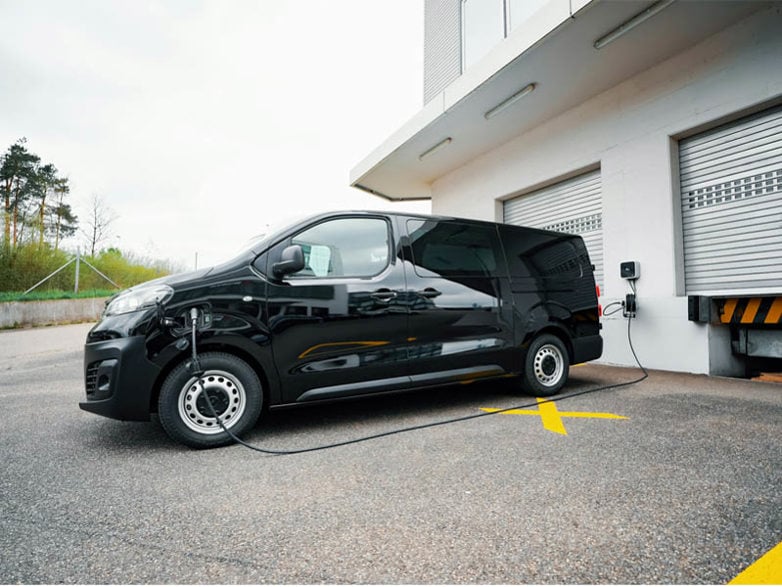Company Van Tax Explained
When it comes to leasing a van for your company, tax can feel like a minefield. Whether you’re self-employed or running a fleet for your business, understanding what you’ll pay and why can save you time, money, and a lot of stress.
One thing you’ll need to understand is the Benefit-in-Kind (BIK) tax, which is a tax that you owe if you use a commercial vehicle for personal journeys.
In this guide, we’ll break down everything you need to know about company van tax, including how it’s calculated, the current rates, and considerations for electric vans. We discuss:
Company van tax, also known as Benefit-in-Kind (BIK) tax, is a taxation levied against any perks or benefits you receive from your employer in addition to your salary, such as a vehicle.
The key factor with BIK tax is whether or not you use the van for personal trips. If the van is strictly used for work, or is part of a fleet, you won’t pay any additional fees.
However, if you use it as a personal vehicle alongside a commercial use, you’ll need to pay up to the taxman.
HMRC have included a bit of room for manoeuvre. Vans used for ‘insignificant’ private journeys are exempt from BIK, such as a one-off trip to pick up the newspaper on the way to work.
Doesn't count as personal use | Counts as personal use |
|---|---|
Driving to and from a job site | Using the vans to complete errands, such as doing the food shop |
Transporting goods, tools, or equipment for work | Taking it on family trips or holidays |
Making a brief stop for coffee or food during work hours | Regular school drop-offs |
However, there is a fine line between commercial and personal use, so it’s your responsibility to ensure you don’t cross it. We’d recommend keeping a record of what you used your van for, just to avoid any confusion.
Also, if the taxman does come asking questions, you will have a detailed record to help them out.
“If your van is used for private purposes and you are required to pay company van tax, it's important to keep records of mileage covered for business use and personal use in the van so that you're not overcharged.”

If you plan on using your van for personal use as well as business, you’ll need to pay BIK tax. Van tax is much more straightforward to work out than company car tax thanks to a single flat rate put in place by the HMRC.
Van benefit charge
The HMRC has a single fixed rate BIK for van drivers which stands at £3,960. The amount of tax that you’ll pay is dependent on your personal income tax level.
For example, if you’re a 20% taxpayer, you’ll pay £792 per year (£66 a month). For higher rate taxpayers in the 40% tax bracket, the cost rises to £1,584 annually (£132 a month).
Tax year to 5th April | 2024/25 | 2025/26 | 2026/27 |
|---|---|---|---|
Benefit in Kind (BIK) | £3,960 | £4,020 | £4,020 |
Tax payable at 20% | £792 | £804 | £804 |
Tax payable at 40% | £1,584 | £1,608 | £1,608 |
Fuel benefit charge
Company van drivers also benefit from a generous BIK rate for any private mileage paid for by their company. For 2025, this is set at a rate of £715.
Like above, you take into consideration your tax rate to find the final amount. If you’re in the 20% bracket, you’ll pay £143 annually, while those in 40% will pay £286.
Tax year to 5th April | 2024/25 | 2025/26 | 2026/27 |
|---|---|---|---|
Benefit in Kind - Fuel | £715 | £769 | £769 |
Tax payable at 20% | £143 | £153.80 | £153.80 |
Tax payable at 40% | £286 | £307.60 | £307.60 |
NOTE: The HMRC has announced that prices will increase from 6th April 2025. Van benefit charge will increase to £4,020 and fuel benefit charge will increase to £769.
Don’t worry, not all fans fall under the wrath of the HMRC. Certain scenarios exempt you from paying BIK tax entirely.
- Pool vans - If the van is shared by multiple employees and isn’t assigned to one person, it’s considered a pool van and is exempt from BIK tax.
- Insignificant personal use - Occasional, insignificant personal use, such as stopping at the shop on your way home from a job, won’t trigger tax liability.
- Electric vans - The BIK rate for pure-electric vans (as of 2025) is 0%, yes that’s right! This is why they’re a great choice for a lot of businesses.

If there’s one trend to look out for in the company van sector, it’s that pure-electric is the way forward. They offer significant benefits compared to their petrol and diesel counterparts, such as:
- Zero BIK tax - An electric van with zero emissions comes with a BIK rate of zero for the 2024/25 tax year, meaning you don’t have to pay a penny towards additional tax bills. For those who use their company van a lot outside of work and have access to charging, it’s a bit of a no-brainer as you could be saving up to £1,594 a year.
- Government incentives - You can also benefit from the government’s Plug-in Van grant, which offers up to £5,000 towards the cost of a new electric van. However, this grant is closing on 31st March 2025, so act quick if you want to make the most of it.
- Environmental benefits - Aside from financial perks, electric vans are a greener option and contribute towards businesses reducing their carbon footprint. This can enhance your company’s reputation as an environmentally conscious organisation.
Any pick-up truck that is classed as a light commercial vehicle (LCV) is subject to the same taxes as a van, but for double cabs, it gets a bit more complicated.
From 6th April 2025, double cab pick-up trucks with a payload capacity of one tonne or more will be classed as passenger cars for tax purposes. This is set by HMRC and applies for capital allowance and BIK tax.
The main consequence of this is that BIK tax for pick-up trucks will drastically change. It will no longer be calculated using the flat rate for vans and it will now take into consideration vehicle list price and CO2 emissions (which are naturally higher for a pick-up).
For example, a Ford Ranger would now fall into the highest BIK bracket thanks to its CO2 emissions, and could set a 40% tax-band driver back £8,800 a year.
However, two-seat pickups and other trucks and vans are still classified as LCVs, as they are not thought to offer the same ‘non-business’ benefits.
Key tips:
- Keep records - Document the primary use of the vehicle to demonstrate it’s used for carrying goods.
- Consult experts - Seek professional advice if you’re unsure about the tax implications of your double cab or crew van.
If you fancy getting a new van for your business, leasing can offer significant tax advantages for businesses:
- VAT reclaim - If your business is VAT-registered and provided the van is used exclusively for business use, you can reclaim up to 100% of the VAT on the lease payments.
- Tax-deductible payments - Monthly lease payments can often be deducted from your taxable profits, reducing your overall tax bill.
- Low upfront costs - Leasing reduces the need for large capital investments, freeing up cash flow for other business expenses.
The amount of VAT that’s reclaimable depends on how much of the van’s mileage is driven for business. If it’s 80% business mileage, then 80% of the VAT can be reclaimed from the taxman.
Like company car tax, the employer has certain National Insurance and reporting obligations if they provide company vans and fuel to their employees. Such as Class 1A National Insurance Contributions (NICs) on the value of the benefit which is based on the vehicle's P11D value and relevant BIK rate.
As with all areas of taxation, it’s crucial for both businesses and individuals to understand the rules and regulations and act accordingly.
Understanding company van tax might seem a daunting prospect at first, but with the right information, it’s much easier to navigate.
From reducing personal use to considering electric options, there’s plenty of ways to minimize your tax bill and make the most of your company van.
If you’re looking to lease a van and want advice tailored for your business, our experts are here to help. Call us today on 0345 811 9595, or visit our latest van leasing deals.
Guide Information
Originally published: 29th September 2016
Last updated: 29th January 2025
